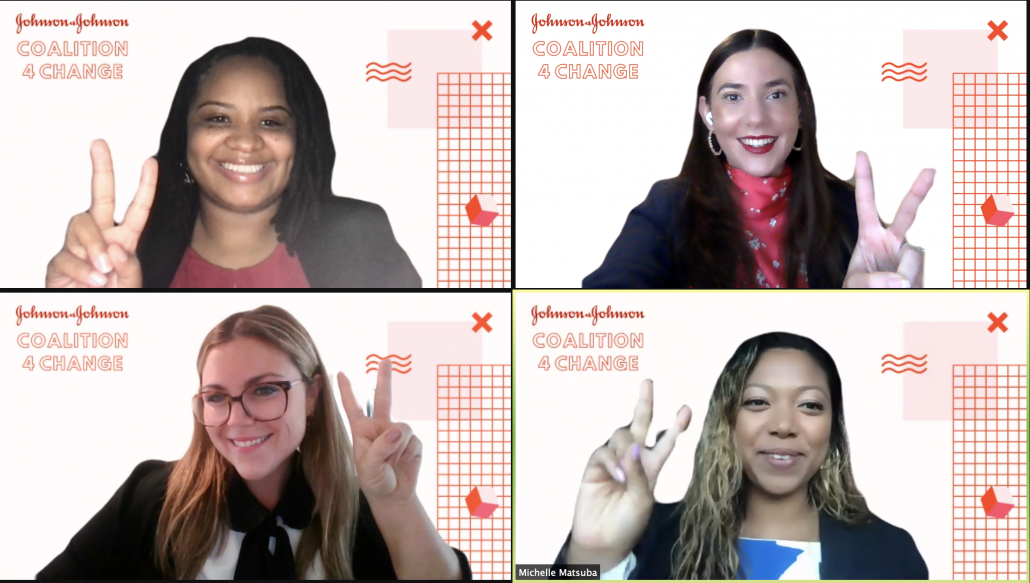Marshall team wins major case competition focused on racial justice

Aria Aaron, Libby Blasser, Michelle Matsuba and Isabella Palacios met for the first time in June 2019 at a professional development program. Over a year later, the four MBA students won the first major case competition by a major business school focused on issues of racial justice.
“[The competition] kind of became this unique moment for all four of us to work together because we’re not all in the same classes,” Blasser said. “That was the perfect moment.”
The team, Coalition 4 Change, won the Emory University John R. Lewis Justice Case Competition in late January. The competition attracted teams from top business schools around the country, including the Haas School of Business at the University of California, Berkeley, and Harvard Business School, and ended with six finalists competing for a cash price of $25,000.
Aaron heard about the competition early last November through an email from the creator of the competition, Willie Sullivan. She then disseminated the case competition through the Marshall Business Competition Program, through which Blasser, Matsuba and Palacios heard about the competition.
“We really got excited about the competition because all four of our team members are not only diverse women at USC Marshall who identify as Black and Latina, but we all believe in the power and responsibility that corporations hold in propelling change for racial justice and social justice,” Blasser said. “For us, this was a moment where we could put our passions into play and get our hands dirty, and really work on something that we care about in a way that we felt would hopefully make a positive impact.”
After deciding to enter the competition, Coalition 4 Change submitted a preliminary application consisting of a PowerPoint presentation about how businesses should address issues of racial inequality. Following that, teams entered into the semifinal round, where they were given six weeks to conduct research and create recommendations for a case prompt for an assigned corporation.
According to Palacios, the team utilized a three-phase approach as they worked on the competition. During the first phase, the four students developed an understanding of the problem of racial injustice in the context of their assigned corporation, Johnson & Johnson. In the second phase, the team researched background information and data within the company in order to create a recommendation for how the corporation could best utilize their resources to address problems of racial injustice. For Coalition 4 Change, this involved researching why Black girls find it difficult to find an interest in the STEM field. The last phase involved validating the planned recommendation with a budget and a market survey.
“I know one of the main things they were looking for was how bold and creative your recommendations were, aside from how feasible,” Palacios said.
Aaron credits the team’s diversity, along with the mutual trust and respect the members have for one another, as the key to the team’s success.
“One of the amazing things is when we were brainstorming, there are so many times somebody would have an idea, and we’d go build upon that and get really excited about it,” Aaron said. “Being on a diverse team allows you to have those different perspectives and bring them all to the table, and at the end of the day, if you don’t bring it to the forefront, those ideas … stay stuck and will never be seen or presented.”
Despite not having any classes together, Blasser said they utilized their classroom experiences from their Marshall coursework to inform their preparation for the competition.
“In the core curriculum for USC Marshall, we all have to work on consulting projects,” Blasser said. “Those projects gave all of us a good baseline understanding of how to approach a complex problem with unique and innovative ideas … All four of us have unique individual skills that we’ve acquired through our professional experience as well as the elective courses that we’ve been taking.”
Through these experiences, the team felt prepared when it came to addressing problems during the competition.
“I think we did a great job of really preparing ourselves for the entirety of the competition,” Aaron said. “We were very intentional about really taking and laying the groundwork first, and really figuring out what the problem was.”
Following the competition, the winning team was awarded a grand prize of $25,000, half of which was donated to non-profit organizations of the members’ choice. Driven by a personal mission of empowering women of color, Coalition 4 Change decided to donate $6,250 each to Step Up, an organization that empowers girls of color to pursue their college education, and Black Girls Code, an organization that encourages Black girls to pursue coding lessons and STEM courses.
“We really went to this competition with the mission, which is our personal mission as well, of empowering women of color to become their full selves, who pursue their opportunities in executive level positions in corporate America, or wherever they want to go,” Palacios said.
As future business executives and leaders of society, the team said they felt MBA students were critical components to the issue of racial injustice and social change in the country.
“This type of competition, as a future business leader, really gives you a perspective of how you can help and how easy it is to help regardless of whether you’re in an executive position or an entry-level employee … to make an impact, drive change and not only to be part of the conversation but really act upon it,” Palacios said.

